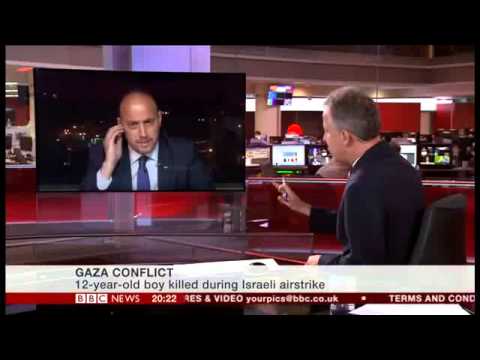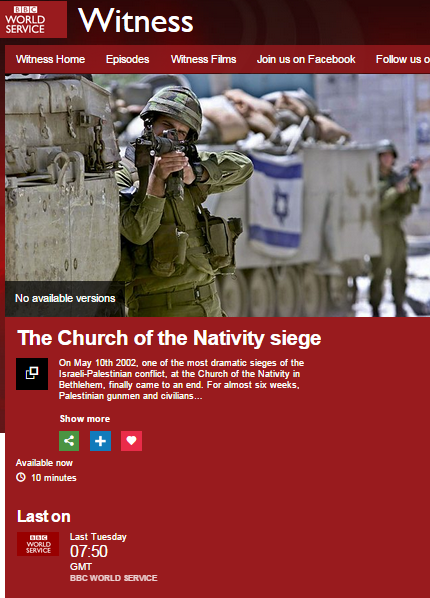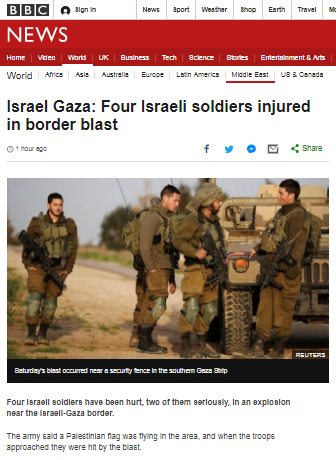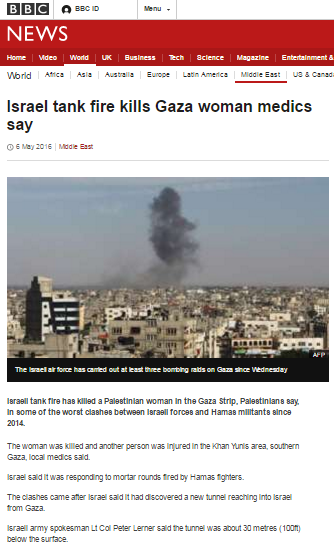Readers may have seen this video doing the rounds on the internet. It is taken from the August 20th edition of the BBC World Service radio programme ‘Newshour’ presented by Owen Bennett-Jones. The programme included two interviews; one with Israel’s Minister of the Economy Naftali Bennett and one with Husam Zomlot who is the executive deputy commissioner for Fatah’s commission for international affairs, a former member of the PLO’s diplomatic mission in London, a visiting fellow at Harvard’s Center for Middle East Studies, a former UN employee and a member of the Oxford Research Group. He is also fairly frequently interviewed by the international media – including the BBC.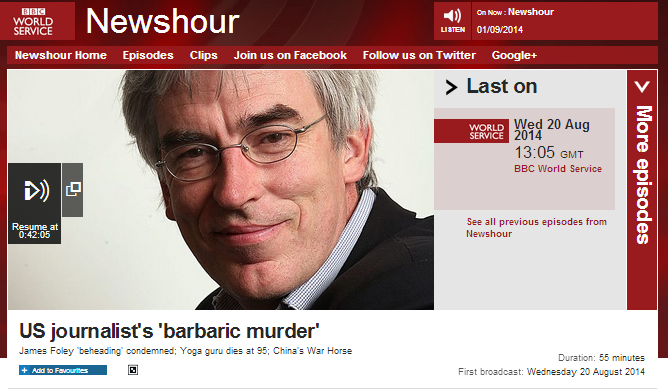
These two interviews provide some interesting insight not just by way of the responses to Bennett-Jones’ questions, but also from the point of view of the wording of some of his own questions and statements and from observation of the occasions on which the presenter considers it essential to intervene in order to correct a mistaken impression given to listeners – and the many more frequent occasions on which he does not. The interviews can be found here, beginning at 31:59. Bennett-Jones’ questions to Naftali Bennett include the following revealing statements.
“Do you consider the land on which Palestinians are living – and have lived, of course, for centuries – to be Jewish land?”
Whilst some Palestinians may indeed have lived in Judea & Samaria “for centuries”, the UN’s definition of Palestinian refugees means that is by no means necessarily the case – but Owen Bennett-Jones makes no effort to clarify that point to listeners.
“Palestine refugees are defined as “persons whose normal place of residence was Palestine during the period 1 June 1946 to 15 May 1948, and who lost both home and means of livelihood as a result of the 1948 conflict.”
Later on, Bennett-Jones misleads audiences with the all too prevalent BBC myth of “’67 borders”.
“But your areas would be within the ’67 borders, would it? You’re not trying to make occupied land into Israeli and, are you?”
Later still, he appears to have fallen into the equally frequently seen double trap of ignoring the San Remo resolution and the Mandate for Palestine whilst at the same time pretending that the 1947 UN Partition Plan has some sort of legal significance.
“Yeah but the reason I asked you, you know, how you see the borders of Jewish land is that I think, you know, most people in the international community would think that the UN vote establishing Israel was the legitimate basis for Israel.”
Towards the end of his conversation with Naftali Bennet, Owen Bennett-Jones proposes the following theory for Western politicians’ approach to radical political Islam in the Middle East.
“Well there is an alternative interpretation of what they [Western politicians] think. They may think that peace in the Middle East – some sort of settlement in which the Palestinian people did have their aspirations fulfilled – would be a constructive start towards building a post-conflict society in which people could live together. They may think like that.”
Naftali Bennett’s reply is as follows:
“I can’t believe you’ve actually asked that. Do you think anything we do in Israel would affect ISIS, would affect Al Qaeda, al Nusra? Do you think these guys really want peace? Have you not been listening to them for the past year and a half? They’re talking about a Caliphate in the whole world and you have to face up and fight this sort of terror; not try and appease them and certainly not at the expense of Israel. Well I can tell you we’re not going to be the sacrificial lamb of the world in the hope of appeasing radical Islam. They kill reporters and behead them: that’s what we’re facing in this area. We expect the world’s support fighting these guys.”
Bennett-Jones then moves on to his next interviewee, Husam Zomlot, who appears to have a problem putting history in its correct sequence, although Bennett-Jones obviously does not see the need to interject. [emphasis added]
Zomlot: “If we go back to the biblical times and the biblical explanations, the map of the world, Owen, will be totally and utterly different – including England and most of Europe as you know. And if we go even further and go back to the Roman time, this is as you know and as you have just asked your…erm…your interviewer, nonsense to start with. I believe it all talks about a bunch of ideologues, purists, exclusivists [sic] brains and mind-sets in Israel right now that are calling the shots. And you have asked him all the right questions I have to say and he answered all the right answers in his own mind. He is not defending Israel proper. He is defending Israel’s expansion, Israel’s colonialism, Israel’s occupation, Israel’s siege. And in his mind, and he believes so, that we do not even deserve to have basic rights and therefore they are fabricating all these stories about beheading journalists somewhere in Iraq, about Palestine and the nation that has been….
Having quietly sat through inaccurate claims of Israeli “expansion”, “colonialism” and “siege”, Owen Bennett-Jones at that point sees the need to interrupt.
“Well hang on: that’s not…that’s not fabricated – that just happened.”
Zomlot carries on:
“It happened somewhere else – in Iraq – as if they are fabricating also the story of the Holocaust that it happened in Europe. Not the story itself, but the reason why they are doing this and using so many other examples to justify their murder of a nation that has been in a quest for self-determination and basic rights; that’s what I mean.”
Bennett-Jones apparently sees no need to clarify his guest’s reference to “fabricating also the story of the Holocaust”. Zomlot himself – a PhD graduate from a London university and therefore presumably a person with a reasonable command of the English language – later claimed that his words were misconstrued and that Bennett-Jones’ introduction of another question prevented him from fully explaining his point.
OBJ: “Let’s just be clear about this. What he [Naftali Bennett] is saying is that Palestinians can live on that land but he is anxious that there will be a tax on the Jewish people so he doesn’t feel that it is appropriate or safe or sensible for the Jewish people to allow the Palestinians to have weapons and the ability to destroy Israel.”
HZ: “Yeah, but that’s like the chicken and the egg. What comes first? Does it…is it their occupation that provoke some of these acts or is it really that we Palestinians are violent by nature? That it’s our violence that provokes their occupation? And I beg to differ, sir, and I beg to say that it’s actually their military occupation, their siege, their colonisation, their daily theft of our resources and land and their daily murder of our families and babies and women. “
As a member of Fatah, Zomlot is no doubt well aware that his organisation came into being long before any “occupation” existed. Owen Bennett-Jones obviously did not see fit to enlighten listeners with that snippet of relevant information or with the fact that it was the combined violence perpetrated by Egypt, Syria and Jordan in June 1967 which brought about Israeli control of the Gaza Strip and Judea & Samaria. Zomlot continues:
“So…eh…eh…eh…”
OBJ: “Yeah.”
HZ: “…if you really want to put the horse before the cart we can discuss till the morning. I believe your question was the right question: should they end their occupation, should they be in line with international consensus and international legitimacy and then we discuss security matters. Israel is dealing with the whole situation from a security point of view because they are not interested in the political issues.”
OBJ: “I think the point that the Israelis would make is that when they did pull out of Gaza and took some settlements out of Gaza, it didn’t solve any problems for them. It’s actually got worse.”
HZ: “Well of course because they pulled out of Gaza to lay siege on the people of Gaza for all these years and turn Gaza into the dark ages. There are no basic goods and commodities and that’s why the people of Gaza has to act in dignity and dig underneath to provide for their babies. So the Israelis haven’t left Gaza for a political breakthrough. They left Gaza to besiege it and to finish off their job in the West Bank and Jerusalem.”
No effort is made by Owen Bennett-Jones to challenge Zomlot’s inaccurate presentation; to point out that there is no such thing as a “siege” on Gaza, that “basic goods and commodities” are freely available there and that the reason for restrictions on Israel’s borders with the Gaza Strip is the terrorism emanating from that territory and the weapons smuggled into it. Zomlot continues:
“And this is exactly what Bennett has just confirmed. My friend; what we are facing now is a situation whereby they call the shots in Israel. The deciders in Israel are not interested in a political solution. They want the land and they want the people of the land – the original people, the natives, the Palestinians – out. Whether besieged in Gaza, whether cycled by walls in the West Bank, whether slowly driven out or even – if they can – another ethnic cleansing like they did in 1948.”
Not a peep is heard from Owen Bennett-Jones despite Zomlot’s inaccurate and defamatory claim of “ethnic cleansing”.
HZ: “This is the situation. They are using negotiations as a tactic, wars as a tactic. They are buying time as they did in Cairo only yesterday. They abruptly…”
OBJ: “OK.”
HZ: “…withdrew their delegation to continue – I believe – they have no interest in ending their occupation, period.”
Making no effort to inform listeners that the Israeli delegation left the negotiations in Cairo after Hamas broke the ceasefire the day before this interview on August 19th, Owen Bennett-Jones then closes the interview.
Revealingly, Zomlot’s assertion that the beheading of journalist James Foley was “fabricated” rightly produced a very swift reaction from Owen Bennett-Jones who obviously could not allow listeners to be misled by that inaccurate claim. Equally revealingly, none of Zomlot’s other no less inaccurate claims evoked any intervention from a BBC presenter charged with promoting audience understanding of international issues.

